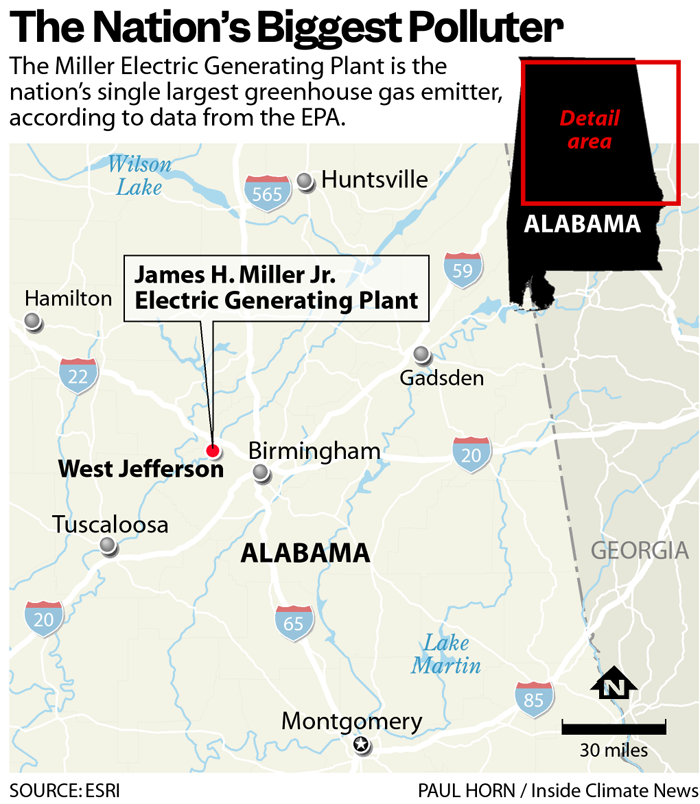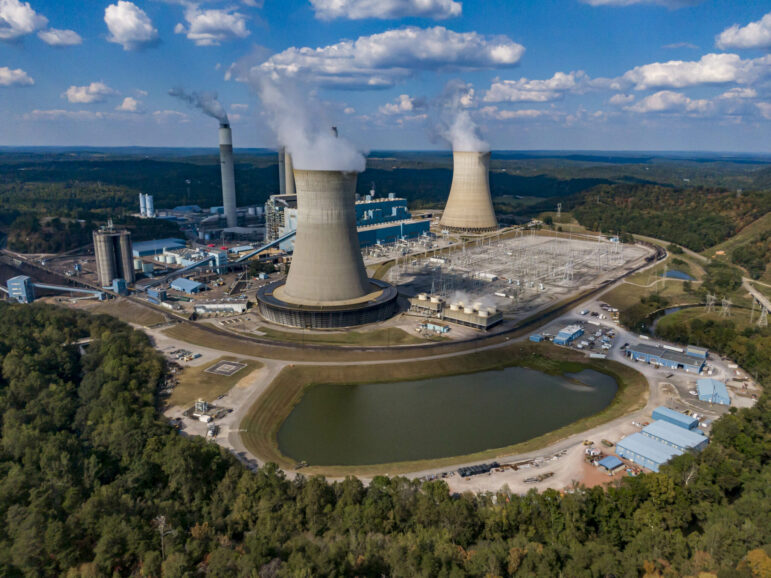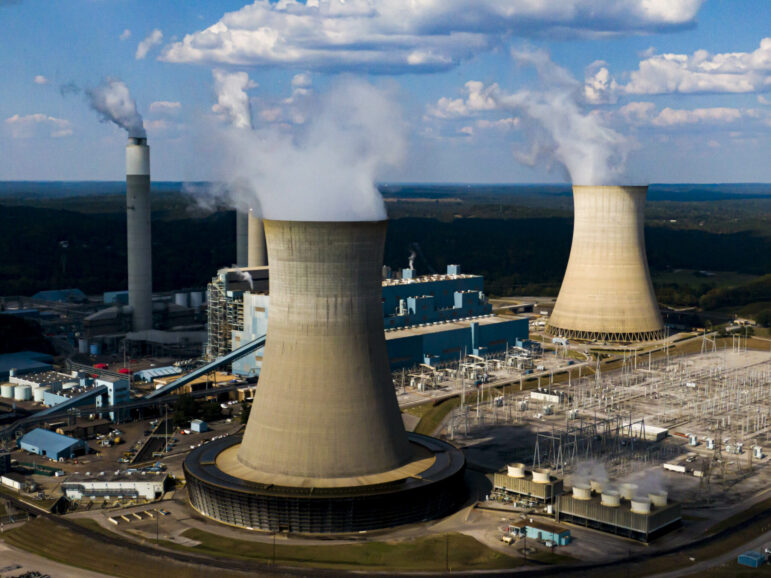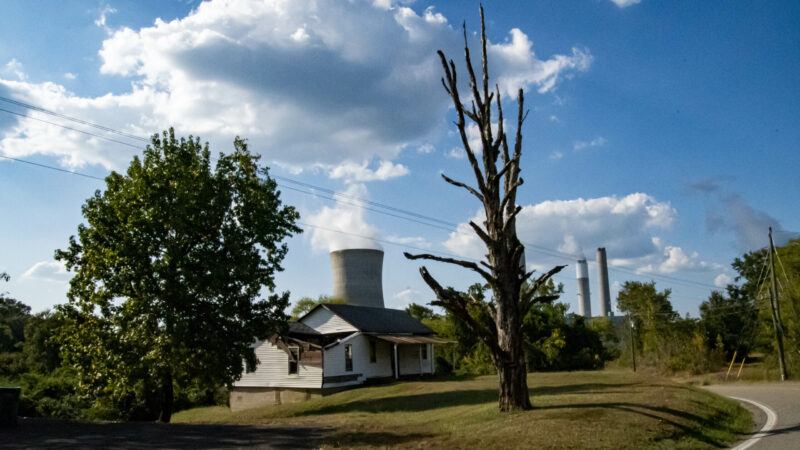An Alabama coal plant again named the nation’s worst greenhouse gas polluter
Dozens of residents live within a few hundred yards of the Miller Plant in West Jefferson, Alabama, the nation's largest polluter of greenhouse gases.
This article originally appeared on Inside Climate News, a nonprofit, independent news organization that covers climate, energy and the environment. It is republished with permission. Sign up for their newsletter here.
By Lee Hedgepeth, Inside Climate News
In West Jefferson, everything happens in the shadow of Alabama Power.
Fewer than 500 people live in the town of under one square mile, located just a 20-minute drive northwest of Birmingham. There’s little in the way of excess. Modest homes dot the landscape, with residents waving as cars pass by. There’s a Dollar General, a Baptist church and an elementary school—the staples of a small Southern community. But in this town, a plant looms large.
Just across the Locust Fork of the Black Warrior River from West Jefferson, towering over the relatively rural Alabama landscape, is the coal-fired James H. Miller Jr. Electric Generating Plant. This year, as in years past, the plant is the single largest greenhouse gas polluter in the United States, according to U.S. Environmental Protection Agency data released in October.
Despite that title and its implications, however, residents aren’t always eager to talk about Alabama Power and its impact on the town. The utility’s economic weight in the community is tangible in the parking lot of the Dollar General as residents come and go, unwilling to go on the record about health and other impacts of the plant on their lives. More than 300 people are employed at the Miller Plant.
“There’s too much to lose,” one man said as he left the dollar store Tuesday afternoon. “Ain’t nobody gonna talk.”

Data for 2022 released by the EPA shows that the Jefferson County plant emitted nearly 22 million metric tons of greenhouse gas pollutants that year, including over 21 million tons of carbon dioxide, 62,000 CO2-equivalent metric tons of methane and 108,000 CO2-equivalent metric tons of nitrous oxide.
Generally, greenhouse gases refer to gases that trap heat in the atmosphere, thereby contributing to climate change.
While carbon dioxide is the primary source of greenhouse gas emissions both in Alabama and the U.S., methane gas has more than 80 times the warming power of CO2 in the two decades after its release into the atmosphere. Nitrous oxide, commonly referred to as laughing gas, can also remain in the atmosphere for more than a century, where it can be converted into nitrogen oxides that deplete the ozone layer.
For comparison, Miller emits around 1.5 million more metric tons of carbon dioxide per year than the entire country of Guatemala, according to global data.
In a statement, a media relations representative for Alabama Power said that Plant Miller is a “key part” of the utility’s plan to provide electricity to customers.
“The four units at Miller are among the largest and most efficient in the country,” Teisha Wallace wrote in an email statement.
The Alabama Power representative did not answer questions about any plan to eventually retire the power plant.
While Alabama Power’s parent company has expressed a commitment to achieving net-zero greenhouse gas emissions by 2050, a new report shows that the utility has done little towards achieving that goal.
The report, published by the Sierra Club in October, gave Alabama Power an “F”—a zero out of 100—on its transition away from fossil fuels, tying the utility for last place among the dozens of companies graded by the environmental nonprofit. According to the report, despite its parent company’s net-zero pledge, only 2 percent of coal and gas generation is currently set to be replaced by renewable energy through 2030.
The utility, a subsidiary of Southern Company, has also garnered widespread criticism from environmental groups and residents over water and air pollution around its plants. In a September EPA hearing in Montgomery, for example, members of the public overwhelmingly opposed the utility’s plan—approved by state-level regulators—to continue storing coal ash, a toxic byproduct of burning coal, in unlined pits near waterways.

Residents near Alabama Power facilities are at an elevated risk of cancers and respiratory hazards, according to EPA data. For example, individuals living within a one-mile radius of Plant Miller are in the 95th to 100th percentile nationally for cancer risk and the 90th to 95th percentile nationally of the respiratory health index, data shows.
While residents may be reluctant to speak with media about the plant’s impacts, data from the Jefferson County Department of Health has revealed that those living around the plant have submitted complaints about conditions in residential areas near the facility.
“One resident has called to report ‘big flakes of dust falling out of the sky from the steam plant,’’’ representatives of several environmental groups wrote to public health officials, citing publicly available documents. “Other residents have reported coal dust falling on their homes and their vehicles, and other unspecified materials landing on their property.”
Christina Andreen Tidwell, a senior attorney for the Southern Environmental Law Center, called Alabama Power’s performance in the EPA emissions data “shameful.”
“It’s shameful that our state is home to the largest greenhouse gas emitter in the country. Coal is a dirty, expensive fossil fuel that threatens our health and environment,” she said. “Boasting about Plant Miller’s size and efficiency does not change its status as the nation’s largest emitter. It’s also at odds with Alabama Power’s parent company, Southern Company’s goal of net zero greenhouse gas emissions by 2050. Clean, renewable options like solar power, battery storage, and energy efficiency are reliable and affordable. Alabama Power should focus on increasing its use of these options instead of defending its use of dirty fossil fuels.”

Michael Hansen served as the executive director of the Greater Birmingham Alliance to Stop Pollution (GASP) until earlier this year. He said he’s unsurprised by Miller topping the EPA’s list of greenhouse gas polluters, and believes the utility should do more to protect the health and welfare of Alabamians it purports to serve.
“It’s so evident that they’re not taking climate change seriously at all,” Hansen said in an interview. “I’ve not seen any real transparency around plans to move away from fossil fuels. They’re just doubling down.”
Hansen said that what has struck him most about the EPA’s greenhouse gas emission data is the sheer scale of Alabama Power’s pollution.
“It’s mind boggling to think about that scale of pollution,” he said. “It’s more pollutants than the entire economies of some countries in South America.”
Hansen said that the conditions in Alabama provide a perfect storm for the utility to continue down its path of pollution.
“It’s the regulatory climate. It’s the political climate. With this situation, Alabama Power will continue to do whatever it wants,” Hansen said. “And that’s not good for anyone but them.”
‘One year of failure.’ The Lancet slams RFK Jr.’s first year as health chief
In a scathing review, the top US medical journal's editorial board warned that the "destruction that Kennedy has wrought in 1 in office might take generations to repair."
Here’s how world leaders are reacting to the US-Israel strikes on Iran
Several leaders voiced support for the operation – but most, including those who stopped short of condemning it, called for restraint moving forward.
How could the U.S. strikes in Iran affect the world’s oil supply?
Despite sanctions, Iran is one of the world's major oil producers, with much of its crude exported to China.
Why is the U.S. attacking Iran? Six things to know
The U.S. and Israel launched military strikes in Iran, targeting Khamenei and the Iranian president. "Operation Epic Fury" will be "massive and ongoing," President Trump said Saturday morning.
Sen. Tim Kaine calls on the Senate to vote on the war powers resolution
NPR's Scott Simon talks to Sen. Tim Kaine, D-Va., about the U.S. strikes on Iran.
Iran strikes were launched without approval from Congress, deeply dividing lawmakers
Top lawmakers were notified about the operation shortly before it was launched, but the White House did not seek authorization from Congress to carry out the strikes.





